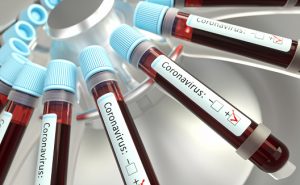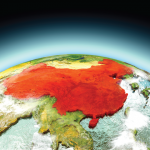To address this shortcoming, the CDC is planning on using public health labs in five cities across the U.S. to perform surveillance of COVID-19, using the infrastructure already developed for surveillance of influenza.

Getty images/Wiley Image Library: Vials of blood in a centrifuge being tested for coronavirus infection.
COVID-19 Testing
On Feb. 6, the CDC announced that it had shipped 200 kits to laboratories across the U.S. Each kit could be used to test over 700 samples; these kits were designed to allow states to conduct their own tests for COVID-19 locally. One week later, however, the CDC announced these kits were flawed; many of them yielded inconclusive results, further hampering our attempts to define the prevalence of COVID-19 in the U.S.
In light of this, on Feb. 29, 2020, the U.S. Food & Drug Administration (FDA) issued emergency authorization for other diagnostic labs to develop their own tests for COVID-19. Stanford and the Cleveland Clinic have both developed in-house assays, as have Quest and LabCorp. The problem with the commercially available tests is that neither Quest nor LabCorp has the facilities to collect the relevant samples, which require protective gear and a dedicated room.
The latest bottleneck in testing is caused by problems obtaining the specialized swabs needed to collect samples. Ironically, one of the major suppliers of these swabs is in Northern Italy, which has been engulfed by the pandemic.
In the U.S., the University of Washington is leading the way when it comes to COVID testing. Following the model developed by a drive-through coronavirus clinic in South Korea, the University of Washington has turned the hospital parking lot into a drive-through COVID-19 testing facility for its employees. Patients are greeted by a nurse in protective gear, who swabs each nostril and tests for both influenza and COVID-19, without the patient getting out of the car. Because this is occurring in a parking lot, the university has achieved a simple solution to an important problem: having appropriate ventilation. Using this system, it can test one person every five minutes; results are typically available in one day.
The 65 hospitals of the Tenet Healthcare Corp., M Health Fairview of the University of Minnesota in Minneapolis, the Mayo Clinic in Rochester and Colorado’s Department of Public Health and Environment were among the first to set up similar systems. Presumably, this system could be replicated in hospital parking lots across the U.S., especially since patients with commercial insurance may be tested for free.


